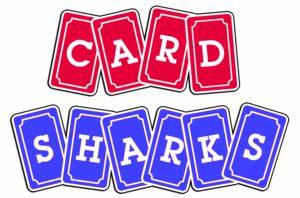The game of bridge is filled with colourful and friendly characters, like the bridge-playing detective Hercule Poirot, or the anthropomorphic Hideous Hog and Rueful Rabbit authored by Victor Mollo.
But you’ll also come to see another type of animal at the card table pretty often: the shark.
“Sharks” are players of expert abilities, but often also an exploitative nature. The card shark stakes higher bets, feigns their inexperience, and swims away victorious and grinning when their opponent has taken the bait.
Card sharks might appear in other games, like poker, pool, or street-played three-card monte. Always beware of any “finding” card games played in streets or alleys, as it’s known for being a cheater’s game that’s impossible to win.
What about card sharks in bridge?
Bridgeur “sharks” might talk about the game like an amateur, or lose a handful of times to boost your confidence. When the stakes are raised, their playing can change to masterful, aggressive, and almost predatory playing styles.
Here are 4 signs you might be playing against a card shark.

1. The shark claims inexperience at the game.
A popular “card shark” technique is convincing their potential opponent (that’s you) that they know nothing about the game, or that their playing is rusty.
It’s the setup behind a typical confidence trick. Once you’re convinced that you are playing against an amateur cardist, you might be tempted to play for higher stakes.
When the shark’s potential opponent believes the setup, their playing ability will change.
2. The shark loses, and usually in front of people.
The first time you see a card shark playing, you are likely to see them lose. Seeing someone else win against a card shark is an actual, used technique that makes them seem easier to play.
Again, potential opponents of the card shark are convinced to play against them far easier when they’ve seen them lose.
What happens then?
Once you’re playing the card shark, they don’t lose as easily.
3. Their playing is terrible… For a while.
The typical sports shark allows their new opponent to win, maybe once or twice.
Why?
It’s another setup: After a couple of wins, the shark’s opponent finds their confidence boosted by a few bars. “I’ve just won, this feels great.”
Then, the shark will ask for another game.
This is where the opponent gets tempted to play against the shark again, but for higher stakes than before. Since a win has already occurred, it creates the more comfortable idea that another win is more likely.
It happens at street games like three-card monte, and it might happen at bridge, too.
4. They talk, and a lot.
The card magician uses misdirection to make many of their tricks work. Instead of looking where you could be, you’re paying attention to something else – and during this moment of redirection, their tricks are easier to pull off.
Misdirection is a trick used by many card sharks and scam artists for the same reason. Beware of anyone who talks more than they are willing to look at their board and play: Pay less attention to their words, and more attention to their moves! Have you ever encountered a typical shark at the card table?
